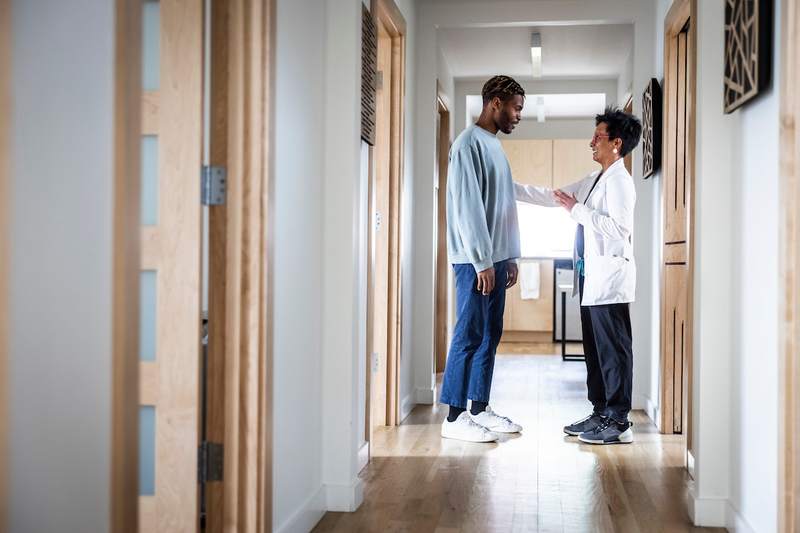Doctors and medical professionals often are in an unusual financial position early in their careers. They start with significant student debt, typically owing $250,000, but they are likely to earn high incomes – the profession’s median pay is $239,200 per year.
Until they can earn that income and reduce their student debt, though, they will struggle to meet the financial standards required to get a conventional loan. That’s where physician mortgages come in as a way for lenders to evaluate medical professionals’ long-term financial outlook to help them afford a home.
Key Takeaways:
- Doctors often earn a lot of money but have significant amounts of student debt.
- Physician loans are special mortgages aimed at doctors facing this unique financial situation.
- These loans have more flexible qualification requirements, making it easier for young doctors to buy a home after residency.
What Are Physician Home Loans?
A physician home loan, sometimes called a doctor home loan or doctor mortgage, is a mortgage available only to recent medical school graduates who may have a low income and a lot of student loan debt but also have high earning potential.
“The challenge for newly minted doctors is that they usually have very little savings left after graduating and high student loan debt, which makes it difficult, if not impossible, to qualify for a traditional mortgage because their debt-to-income ratios are too high,” says Casey Fleming, an author and mortgage advisor with Silicon Valley Mortgage Corp. in Los Gatos, California. “However, statistically, they are likely to be high-income earners over their careers and have stable, constantly increasing income. Lenders understand that this is a profile of a good lifetime customer.”
Physician loans are designed to make it easier for doctors with a lot of debt and low income to qualify for a mortgage, allowing them to buy a home. Several factors make these loans appealing.
No Down Payment Needed
One major perk of physician loans is that they require no down payment. Most mortgage programs, such as Federal Housing Administration loans, require that you have at least 3.5% of the home’s value in a down payment, though some people aim for 20% to avoid having to pay for private mortgage insurance on a conventional loan. With a physician mortgage, you can skip the down payment entirely, financing the entire value of the home.
No PMI Required
PMI is an additional monthly payment you may need to make to your lender. This insurance protects the lender if you default on your loan and is usually required if you don’t offer a large enough down payment.
Physician loans have no PMI requirement, even if you make no down payment. PMI can typically cost between 0.1% and 2% of the loan amount annually, so avoiding PMI helps you save significantly.
Higher DTI Ratio Allowed
Your debt-to-income ratio compares your monthly income with your total monthly debt payments. Most lenders set a maximum DTI ratio of 45% to 50%, though lower ratios are better.
Doctors, however, often have very high DTI ratios due to their high student loan debt. Residents and doctors just out of school may also have relatively low incomes, despite the high odds that they’ll earn hundreds of thousands per year once they advance in their careers.
Lenders will still look at your total debt burden, including non-student debts such as credit cards or auto loans, but a high DTI ratio won’t be a deal breaker the way it would be with a conventional mortgage.
Interest Rates
Like other mortgage programs, you’ll have to pay interest on the money you borrow through a physician mortgage.
Many physician loans have an adjustable rate. That means that after an initial period of a few years, your loan’s interest rate will change based on market forces, so your monthly payment may increase.
Fixed rates are less common for physician loans but may be available from some lenders.
“Interest rates and costs are competitive but generally very slightly higher than with a conventional loan,” Fleming says. “For this reason, if a borrower can qualify using conventional underwriting, they would save money with a conventional loan.”
What’s Your Goal?
Buy A Home
Discover mortgage options that fit your unique financial needs.

Refinance
Refinance your mortgage to have more money for what matters.
Tap Into Equity
Use your home’s equity and unlock cash to achieve your goals.
Who Qualifies For Physician Home Loans?
Each lender sets its own eligibility requirements for physician mortgages. To start, you’ll need to have a qualifying degree. Lenders typically offer physician loans to doctors with the following degrees, though some lenders may only approve loans for some, but not all, of these degrees:
- Doctor of osteopathic medicine
- Doctor of science
- Medical doctor
- Doctor of dental medicine
- Doctor of dental surgery
- Doctor of podiatric medicine
- Doctor of veterinary medicine
In addition to requiring a degree that qualifies with your lender of choice, lenders will consider other factors. For example, you’ll also need to show proof of income or employment.
Ready To Become A Homeowner?
Get matched with a lender that can help you find the right mortgage.
Physician Home Loan Requirements
Physician loans are more flexible than other types of mortgages, but that doesn’t mean they have no requirements. To qualify, you’ll still need to go through an underwriting process. During that process, your lender will consider these factors:
Credit Score
You typically need a good credit score to qualify for a physician mortgage. While each lender can set its own requirements, it’s not unusual to need a score of at least 700 to qualify.
DTI Ratio
Physician mortgages have more flexible DTI ratio requirements than other loans, thanks to the much higher debt burden that new physicians face. Often, you can qualify with a DTI ratio of 50% or higher.
Down Payment
Another perk of physician loans is that they have lower down payment requirements than other loan programs. Some lenders require no down payment, though offering one can improve your chances of qualifying.
Property Requirements
Each lender can set its own rules regarding which properties are eligible for a physician loan. Typically, you cannot use the loan to buy a second home or investment property. You can only use the loan to buy a primary residence. Many lenders also won’t approve physician loans for properties other than single-family homes.
Take The First Step To Buying A Home
Find a lender that will work with your unique financial situation.
How To Find A Physician Home Loan
Many lenders offer physician loans, though some may not advertise that fact much. Given that doctors make up a small percentage of the population, banks may not want to put the time into advertising a loan program that appeals to a small market. Expect to do some research into lenders that serve the area you’re looking to buy in and ask if they offer physician loans.
Why Do Lenders Offer Physician Home Loans?
Lenders offer physician loans because doctors aren’t well served by more traditional mortgages. Early in their careers, doctors are saddled with massive amounts of debt and may not have reached their full income potential, leaving them to struggle with qualifying for a typical mortgage.
However, despite their high debt burden, making a loan to a doctor is often a good bet. Doctors increase their income significantly after leaving school and finishing residency, leaving them with plenty of money to use for paying off a mortgage.
Physician loans allow lenders to extend a loan to someone who may not qualify using typical criteria but likely will have little trouble paying the loan back as they advance in their career.
Physician Home Loan Alternatives
Physician mortgages are a good option for doctors looking to buy a home, but they’re not right for everyone. Other loan programs may be a good fit, depending on your needs and financial situation.
- Conventional loans. Conventional loans may offer more appealing interest rates and terms than doctor loans if you have good credit, a reasonable DTI ratio and money for a down payment.
- FHA loans. FHA loans have down payment requirements as low as 3.5% and allow a credit score as low as 500 with a 10% down payment. You’ll have to pay for mortgage insurance, but these loans may be easier to qualify for if you have poor credit.
- Veterans Affairs loans. VA loans are intended for veterans and military service members, so unless you served in the armed forces in addition to becoming a doctor, you probably won’t qualify. However, if you do, these loans offer a lot of perks, like 100% financing and reduced closing costs.
- U.S. Department of Agriculture loans. USDA loans are only available to low- and moderate-income borrowers looking to buy a home in a designated rural area but offer perks like not requiring a down payment.
Pros And Cons Of Physician Home Loans
Physician home loans have many perks, but it’s also important to consider the drawbacks before applying.
Physician Home Loan Pros And Cons
| Pros | Cons |
|---|---|
| No down payment requirement | Physician loans often have higher rates than other loans. |
| More flexible DTI ratio requirements | You can only use these loans to buy a primary residence. |
| Can qualify with a job offer or proof of future employment | Many physician loans come with an adjustable rate. |
| Buying a home with no down payment raises the odds of going underwater on the loan. |
FAQ
Here are answers to some common questions about physician loans:
The Bottom Line
Physician mortgages give doctors who may not be able to qualify for traditional mortgages the opportunity to buy a home early in their career. If you’re a doctor and want to buy a home, consider asking lenders near you about their physician loan program. The flexible requirements and low minimum down payments mean you may be able to buy a home much sooner than you think.
More From Quicken Loans:

T.J. Porter
T.J. Porter is a Boston-based writer who focuses on credit cards, credit and bank accounts. When he's not writing about all things personal finance, he enjoys cooking, esports, soccer, hockey, and games of the video and board varieties.












